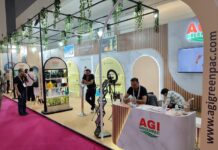
SIG has now sold over 150 million packs with its award-winning Signature, the world’s first aseptic carton packaging material linked up to 100% to renewable materials.
“SIG’s ground-breaking Signature is a great success, with over 150 million packs sold,” said Alina Theissen Hageresch, SIG’s marketing manager Sustainability and Responsibility Europe. “Increased uptake shows that its strong environmental credentials offer customers an answer to consumers wanting more sustainable packaging alternatives as they seek to do their part for a low-carbon future.”
Growing demand for sustainable packaging
Consumers’ priorities are changing – a clear majority (73%*) now say they would change their consumption habits to reduce their environmental impact. As brands seek to meet the demand for more sustainable products, their packaging choice has a critical role to play as the first key touchpoint for consumers.
SIG’s standard carton packs, made with around 75% renewable paper board from FSCTM-certified sustainable sources, already offer a significantly better environmental performance than alternative packaging types. The carbon footprint of a carton pack is up to 70% lower than plastic or glass bottles.
Launched in 2017, SIG’s innovative Signature packaging material links the polymers used to 100% forest-based renewable materials via an independently certified mass balance system. SIG chose tall oil – a residue extracted from wood in the papermaking process – as the forest-based feedstock. It is a by-product from another industry rather than an agricultural crop requiring land and resources that could be used to produce food. An independent lifecycle assessment shows that Signature reduces the carbon footprint of carton packs even further – by 45% to 58% (European average) depending on the option selected.
Innovative solutions for all markets
Signature is available in two options to meet the demand for sustainable packaging solutions across all market segments.
The aluminum-free Signature 100 for dairy products is the world’s first aseptic carton packaging material linked to 100% forest-based renewable material. Signature full barrier includes an ultra-thin layer of aluminum, certified against the Aluminum Stewardship Initiative (ASI) standards, to protect products like orange juice that are more sensitive to light and oxygen.
The European and North American markets are pioneering the shift to more sustainable packaging solutions. Early adopters of Signature include Unilever’s B-Better in Belgium, Candia in France, nutpods in the USA, and Water Cubed in the UK.
“B-Better water was launched with strong brand values: help consumers to be good to themselves and do better for the planet,” said Hélène Esser, B-Better co-founder and marketing manager Refreshments at Unilever. “Signature’s unmatched environmental credentials, combined with SIG’s unique bottle-shaped combidome carton, align perfectly with our strapline: ‘It’s a start for less plastic and a better planet’.”
Innovating to go Way Beyond Good
Growing demand for Signature packaging material linked up to 100% to renewable materials is the latest milestone in SIG’s journey to go Way Beyond Good by putting more into society and the environment than it takes out.
Sustainable innovation is central to this ambition, and SIG has achieved a host of other industry firsts — first to enable customers to put the FSC label on any of its packs, first to offer aluminum-free aseptic carton packs, first to offer a paper straw solution for aseptic carton packs, first to offer carton packs with responsibly-sourced ASI-certified foil and, most recently, first to offer cartons made with recycled plastics.
IndiFoodBev — authentic, impactful and influential
An English-language food and beverage processing and packaging industry B2B platform in print and web, IndiFoodBev is in its third year of publication. It is said that the Indian food and beverage industries represent approximately US$ 900 billion in revenues which implies more than 20% of the country’s GDP. Eliminating the wastage on the farmside can help to deliver more protein to a higher number of the population apart from generating sizable exports. The savings in soil, seeds, water, fertilizer, energy and ultimately food and nutrition could be the most immense contribution that country is poised to make to the moderation of climate change.
To improve your marketing and grow sales to the food and beverage processing and packaging industry, talk to us. Our research and consulting company IppStar [www.ippstar.org] can assess your potential and addressable markets in light of the competition. We can discuss marketing, communication, and sales strategies for market entry and growth.
Suppliers and service providers with a strategy and budget for targeted marketing can discuss using our hybrid print, web, video, and social media channels to create brand recognition linked to market relevance. Our technical writers are ready to meet you and your customers for content.
The second largest producer of fruit and vegetables in the world is continuously expanding processing capacities and delivery systems with appropriate innovative technologies. We cover product and consumer trends, nutrition, processing, research, equipment and packaging from farm to thali. Get our 2025 media kit and recalibrate your role in this dynamic market. Enhance your visibility and relevance to existing markets and turn potential customers into conversations. Ask for a sample copy of our bi-monthly in print or our weekly IndiFoodBev eZine each Wednesday.
For editorial info@ippgroup.in — for advertisement ads1@ippgroup.in and for subscriptions subscription@ippgroup.in
Naresh Khanna – 10 February 2025
Subscribe Now










